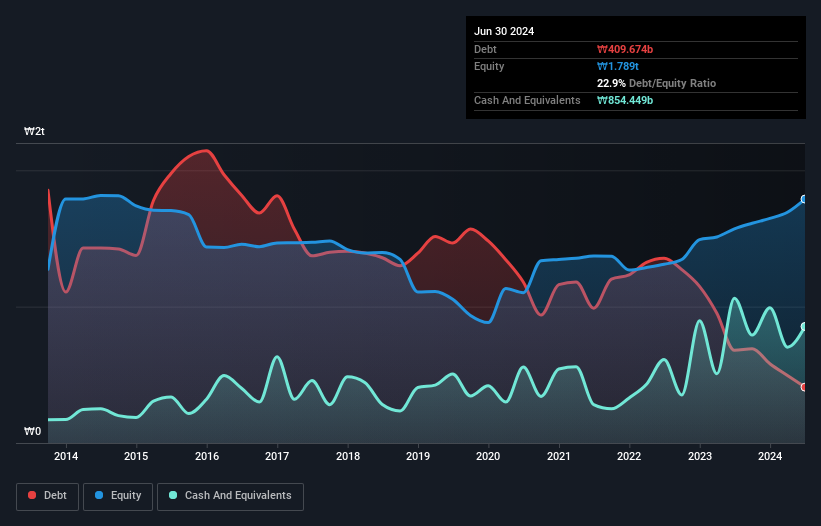
David Iben put it well when he said, 'Volatility is not a risk we care about. What we care about is avoiding the permanent loss of capital.' It's only natural to consider a company's balance sheet when you examine how risky it is, since debt is often involved when a business collapses. We note that Hyundai Rotem Company (KRX:064350) does have debt on its balance sheet. But the real question is whether this debt is making the company risky.
When Is Debt Dangerous?
Debt and other liabilities become risky for a business when it cannot easily fulfill those obligations, either with free cash flow or by raising capital at an attractive price. In the worst case scenario, a company can go bankrupt if it cannot pay its creditors. However, a more common (but still painful) scenario is that it has to raise new equity capital at a low price, thus permanently diluting shareholders. Having said that, the most common situation is where a company manages its debt reasonably well - and to its own advantage. The first step when considering a company's debt levels is to consider its cash and debt together.
Check out our latest analysis for Hyundai Rotem
What Is Hyundai Rotem's Debt?
The image below, which you can click on for greater detail, shows that Hyundai Rotem had debt of ₩409.7b at the end of June 2024, a reduction from ₩679.5b over a year. However, it does have ₩854.4b in cash offsetting this, leading to net cash of ₩444.8b.

How Healthy Is Hyundai Rotem's Balance Sheet?
Zooming in on the latest balance sheet data, we can see that Hyundai Rotem had liabilities of ₩2.99t due within 12 months and liabilities of ₩187.8b due beyond that. Offsetting these obligations, it had cash of ₩854.4b as well as receivables valued at ₩522.7b due within 12 months. So it has liabilities totalling ₩1.80t more than its cash and near-term receivables, combined.
Hyundai Rotem has a market capitalization of ₩5.70t, so it could very likely raise cash to ameliorate its balance sheet, if the need arose. But we definitely want to keep our eyes open to indications that its debt is bringing too much risk. While it does have liabilities worth noting, Hyundai Rotem also has more cash than debt, so we're pretty confident it can manage its debt safely.
On top of that, Hyundai Rotem grew its EBIT by 40% over the last twelve months, and that growth will make it easier to handle its debt. The balance sheet is clearly the area to focus on when you are analysing debt. But ultimately the future profitability of the business will decide if Hyundai Rotem can strengthen its balance sheet over time. So if you're focused on the future you can check out this free report showing analyst profit forecasts.
Finally, while the tax-man may adore accounting profits, lenders only accept cold hard cash. While Hyundai Rotem has net cash on its balance sheet, it's still worth taking a look at its ability to convert earnings before interest and tax (EBIT) to free cash flow, to help us understand how quickly it is building (or eroding) that cash balance. Over the last three years, Hyundai Rotem actually produced more free cash flow than EBIT. There's nothing better than incoming cash when it comes to staying in your lenders' good graces.
Summing Up
Although Hyundai Rotem's balance sheet isn't particularly strong, due to the total liabilities, it is clearly positive to see that it has net cash of ₩444.8b. The cherry on top was that in converted 242% of that EBIT to free cash flow, bringing in ₩66b. So we don't think Hyundai Rotem's use of debt is risky. Above most other metrics, we think its important to track how fast earnings per share is growing, if at all. If you've also come to that realization, you're in luck, because today you can view this interactive graph of Hyundai Rotem's earnings per share history for free.
At the end of the day, it's often better to focus on companies that are free from net debt. You can access our special list of such companies (all with a track record of profit growth). It's free.
If you're looking to trade Hyundai Rotem, open an account with the lowest-cost platform trusted by professionals, Interactive Brokers.
With clients in over 200 countries and territories, and access to 160 markets, IBKR lets you trade stocks, options, futures, forex, bonds and funds from a single integrated account.
Enjoy no hidden fees, no account minimums, and FX conversion rates as low as 0.03%, far better than what most brokers offer.
Sponsored ContentValuation is complex, but we're here to simplify it.
Discover if Hyundai Rotem might be undervalued or overvalued with our detailed analysis, featuring fair value estimates, potential risks, dividends, insider trades, and its financial condition.
Access Free AnalysisHave feedback on this article? Concerned about the content? Get in touch with us directly. Alternatively, email editorial-team (at) simplywallst.com.
This article by Simply Wall St is general in nature. We provide commentary based on historical data and analyst forecasts only using an unbiased methodology and our articles are not intended to be financial advice. It does not constitute a recommendation to buy or sell any stock, and does not take account of your objectives, or your financial situation. We aim to bring you long-term focused analysis driven by fundamental data. Note that our analysis may not factor in the latest price-sensitive company announcements or qualitative material. Simply Wall St has no position in any stocks mentioned.
About KOSE:A064350
Hyundai Rotem
Manufactures and sells railway vehicles, defense systems, and plants and machinery in South Korea and internationally.
Flawless balance sheet with high growth potential.
Similar Companies
Market Insights
Community Narratives



